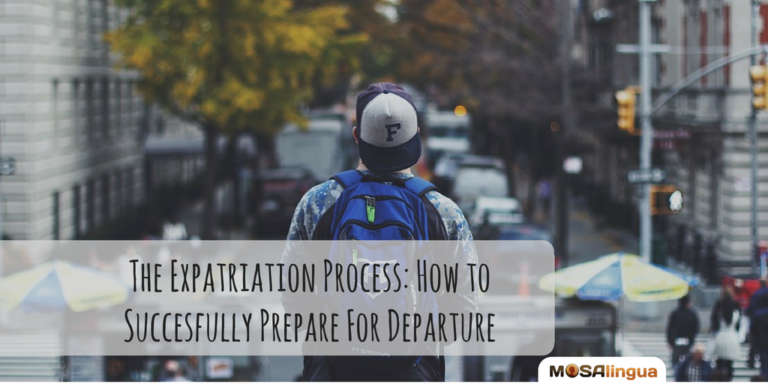The expatriation process, going to live abroad, is not something you can do at the last minute. It’s a project that needs to be well prepared months, even a year, ahead of time. Between administrative tasks, dealing with your current residence, figuring out accommodations, and discovering the country, you’re bound to need a checklist of things to do before leaving. Future expats, get ready to go!

Expatriation, Millions of Americans Live Abroad!
The number of non-military American expatriates is “guesstimated” at anywhere from 3 to 9 million. This number is so vague because there is no good way of knowing who has left and who has returned. These numbers are drawn from American citizens registering a birth abroad and those paying less tax to the US taxation or receiving credit for foreign taxes paid. Both these methods are fallacious because many are the ones who work abroad for a few months a year, or have a child abroad and come back a while after. More and more Americans are choosing to become expats — or are at least trying it.
Expatriation means going to live abroad. Whether it is just for a few months with a Working Holiday Visa, or for a few years with an international branch of a company, and whether it’s because it’s something you’ve always wanted to do, or for work, you will need a certain amount of organization before your departure. And that’s why we’ve put together the main tasks to do for successfully moving abroad.
The Expatriation Process: How to Successfully Prepare for Departure
We’ve compiled a list of 5 things to do for a successful expatriation process, from the administrative procedures to the first steps to take to familiarize yourself with your host country. We highly advise you to start planning a few months before leaving to avoid having to rush things two days prior to departure. Especially because some tasks (such as obtaining a work permit) can be long and fastidious…
1. Finding work
The chances of finding work abroad are fortunately increasingly high: you can go abroad with programs such as VIE (Volunteer for International Experience), apply for a Working Holiday Visa, become a voluntary worker abroad, do a humanitarian mission, ask your boss to move to a branch abroad, or you could do an internship in a company as part of your studies.
According to many expats, the success of the expatriation process highly depends on the goal in mind: you have to have a clearly defined goal, a clear idea of what you want to do and you mustn’t go without really knowing what you’ll do once you get there. Going to live abroad without a clear goal is a great way to make sure you’ll go back to your home country within a few months!
Having a job before leaving or, at least, knowing how to get some income once you arrive will allow you to go there with a clear mind and to make sure you’ll get by for at least a few months. Being alone, with no money, all while on the other side of the globe is a horrible experience (I’m talking from experience). You should, at the very minimum, know which steps to take once in the host country and have the answers to questions like:
- What are the legal or linguistic requirements for working there?
- Is it easy to find work?
- Where should you go to find work?
- What type of work contracts are available?
2. Gather all the necessary paperwork

Obviously, you’ll have to book the tickets in advance (especially because some countries, such as Argentina, will ask you to have the tickets before requesting a Working Holiday Visa.) So, make sure you are well informed before starting the formalities). You might also have to ask for an international driving permit.
We recommend making a photocopy of all your important documents such as your passport, driver’s license, diplomas, etc. before leaving.
3. Know your host country
Essential things to know for a smooth expatriation process: find out its currency (the exchange rate, what you can do with, let’s say, $500, etc.), primary language, living conditions, difficulties that often arise there, etc. You can find all this information on expat communities in blogs and guides. (Small warning: these can scare you off; reading some of them will make you think that any foreign country is dangerous to live in). Don’t hesitate to contact expats who are already there to get a good idea of how it will be like.
4. Think of your health
Prior to departure, you should have a full health check-up and be vaccinated depending on what is required/recommended in websites such as this one. Also, don’t forget your vaccination certificate. It could be useful. It’s important to have medical insurance to help you out in case of an emergency. Additionally, inform yourself about the types of social safety nets that exist in the country.
Although knowing English is useful in most places around the world, especially with young people as they are more likely to have learned some at school and to have been exposed to it through technology, don’t make the mistake of thinking that it will be enough. You might find yourself in a situation where communication is crucial (such as a medical emergency, though I hope not!). If you aren’t able to communicate your needs, you will also have higher chances of becoming the target of scammers.
5. Learn the basics of the language

To make sure you have the basics of a language or more, download our free travel phrasebooks. They give you the most useful vocabulary and expressions. To go one step further, you can also download the MosaLingua app to learn, Spanish, French, German, Portuguese, Italian, or Russian.
Other things to think about
Will you be taking your furniture with you? Some choose to only go with a backpack, others take all they have. In the latter case, you’ll have to start to get prepared a few months ahead. It’s never easy to move your furniture abroad. Do your research and find out the details and costs of moving your furniture abroad. Specialized international moving companies can be very costly.
If you own a place in your home country, what will happen to it? Will you sell it? Rent it? Remember that the place will deteriorate if nobody lives there. The same goes for other properties, such as cars. Also, make sure you’ve canceled any contracts and subscriptions you have and announced your departure if your home country requires you to do so.
If you don’t have a place to live as soon as you arrive, at the very least find out where you can stay for the first few nights. Make sure you know what you should do straight away. Is it best to go for a hotel, to rent an entire apartment/house, or to share one? Think of where you’ll be sleeping for the next few days or weeks. I like adventures, but I still think it’s best to know where you’ll be sleeping.
Expatriation is a great adventure. You gain autonomy, an open mind, and new experiences, but it’s always best to think through the expatriation process thoroughly. My fellow expats, if you have any other advice, share it in the comments section 😉
Related posts:
Start learning a new language today

Good news: we can help!
More good news: you can get started for free! Start your free trial now and for the next 15 days, take advantage of the most effective language learning method on the market!
Vocabulary flashcards, videos with subtitles, audiobooks, articles adapted to your level – with MosaLingua Premium (Web & Mobile), you’ll have access to all this and more. Get started right now. It’s free—and risk-free—to try!




Comments